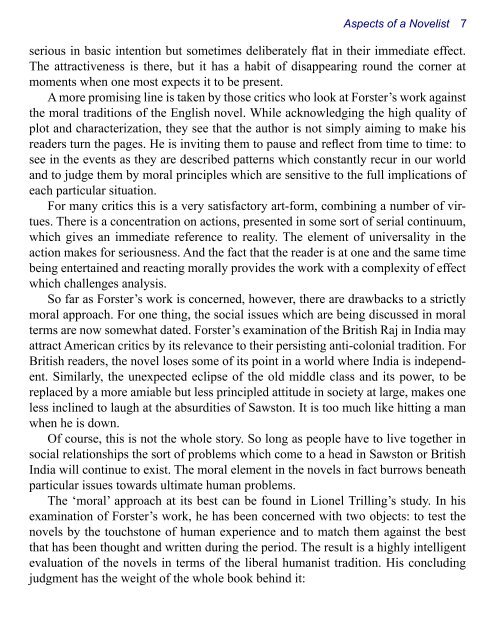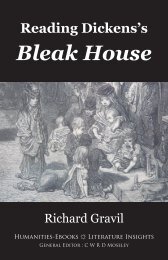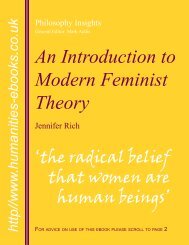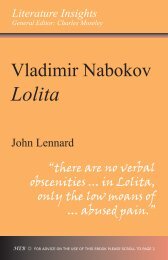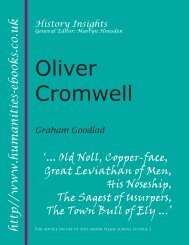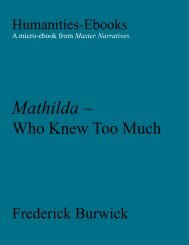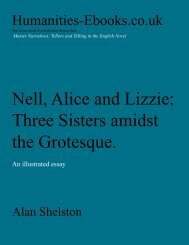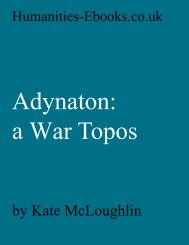The Achievement of E. M. Forster - Humanities-Ebooks
The Achievement of E. M. Forster - Humanities-Ebooks
The Achievement of E. M. Forster - Humanities-Ebooks
You also want an ePaper? Increase the reach of your titles
YUMPU automatically turns print PDFs into web optimized ePapers that Google loves.
Aspects <strong>of</strong> a Novelist <br />
serious in basic intention but sometimes deliberately flat in their immediate effect.<br />
<strong>The</strong> attractiveness is there, but it has a habit <strong>of</strong> disappearing round the corner at<br />
moments when one most expects it to be present.<br />
A more promising line is taken by those critics who look at <strong>Forster</strong>’s work against<br />
the moral traditions <strong>of</strong> the English novel. While acknowledging the high quality <strong>of</strong><br />
plot and characterization, they see that the author is not simply aiming to make his<br />
readers turn the pages. He is inviting them to pause and reflect from time to time: to<br />
see in the events as they are described patterns which constantly recur in our world<br />
and to judge them by moral principles which are sensitive to the full implications <strong>of</strong><br />
each particular situation.<br />
For many critics this is a very satisfactory art-form, combining a number <strong>of</strong> virtues.<br />
<strong>The</strong>re is a concentration on actions, presented in some sort <strong>of</strong> serial continuum,<br />
which gives an immediate reference to reality. <strong>The</strong> element <strong>of</strong> universality in the<br />
action makes for seriousness. And the fact that the reader is at one and the same time<br />
being entertained and reacting morally provides the work with a complexity <strong>of</strong> effect<br />
which challenges analysis.<br />
So far as <strong>Forster</strong>’s work is concerned, however, there are drawbacks to a strictly<br />
moral approach. For one thing, the social issues which are being discussed in moral<br />
terms are now somewhat dated. <strong>Forster</strong>’s examination <strong>of</strong> the British Raj in India may<br />
attract American critics by its relevance to their persisting anti-colonial tradition. For<br />
British readers, the novel loses some <strong>of</strong> its point in a world where India is independent.<br />
Similarly, the unexpected eclipse <strong>of</strong> the old middle class and its power, to be<br />
replaced by a more amiable but less principled attitude in society at large, makes one<br />
less inclined to laugh at the absurdities <strong>of</strong> Sawston. It is too much like hitting a man<br />
when he is down.<br />
Of course, this is not the whole story. So long as people have to live together in<br />
social relationships the sort <strong>of</strong> problems which come to a head in Sawston or British<br />
India will continue to exist. <strong>The</strong> moral element in the novels in fact burrows beneath<br />
particular issues towards ultimate human problems.<br />
<strong>The</strong> ‘moral’ approach at its best can be found in Lionel Trilling’s study. In his<br />
examination <strong>of</strong> <strong>Forster</strong>’s work, he has been concerned with two objects: to test the<br />
novels by the touchstone <strong>of</strong> human experience and to match them against the best<br />
that has been thought and written during the period. <strong>The</strong> result is a highly intelligent<br />
evaluation <strong>of</strong> the novels in terms <strong>of</strong> the liberal humanist tradition. His concluding<br />
judgment has the weight <strong>of</strong> the whole book behind it:


